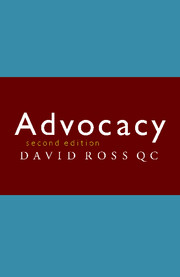Book contents
- Frontmatter
- Contents
- Foreword
- 1 The nature of advocacy
- 2 Preparation
- 3 Witnesses and questions
- 4 Examination-in-chief
- 5 Cross-examination: its qualities
- 6 Cross-examination: method and style
- 7 Cross-examination of experts
- 8 Cross-examination on documents
- 9 Re-examination
- 10 Admissibility, objections and submissions
- 11 The addresses
- 12 Plea in mitigation
- 13 Appeals
- 14 Legal writing
- 15 Etiquette and ethics
- Index
- Frontmatter
- Contents
- Foreword
- 1 The nature of advocacy
- 2 Preparation
- 3 Witnesses and questions
- 4 Examination-in-chief
- 5 Cross-examination: its qualities
- 6 Cross-examination: method and style
- 7 Cross-examination of experts
- 8 Cross-examination on documents
- 9 Re-examination
- 10 Admissibility, objections and submissions
- 11 The addresses
- 12 Plea in mitigation
- 13 Appeals
- 14 Legal writing
- 15 Etiquette and ethics
- Index
Summary
Introduction
[14000] Every lawyer does a lot of formal writing. It will usually be a submission to the court. Your writing must be accurate and persuasive. It is the preliminary and important part of advocacy. You don't want to run any risk of being misunderstood. A listener of spoken words may interpret them in a way that was not intended. That may be conscious or unconscious. With written words, that risk should be reduced. The more accurate the writing, the lower the risk.
[14005] Courts are increasing their demand for written submissions. Courts of Appeal have practice directions to that effect. Not only that, but trial courts to a greater degree than ever before expect submissions in writing. Your submissions on complex legal propositions to a trial court have a greater chance of success when they are in writing, supplemented by your spoken argument. Kirby J said:
With the increase of workload of the courts, there is a growing pressure to commit more argument to writing. Thus it is more important today to recognise the special skills of written advocacy. On average, the written word can be read four times more quickly than the same word can be spoken.
But keep your written submission as short as you can. The longer it is, the less likely is the judicial officer to read it and absorb it.
- Type
- Chapter
- Information
- Advocacy , pp. 147 - 164Publisher: Cambridge University PressPrint publication year: 2007

